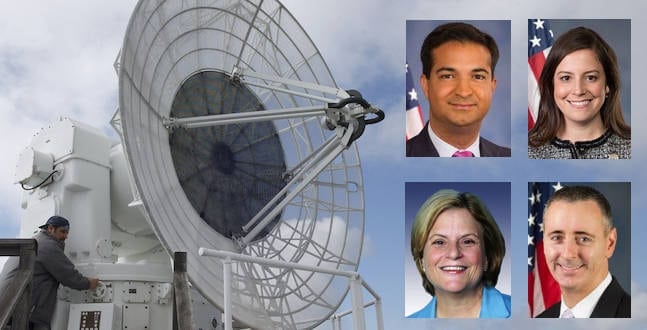
Clockwise from top left, Representatives Carlos Curbelo, Elise Stefanik, Brian Fitzpatrick and Ileana Ros-Lehtinen were among the Republicans on the Climate Solutions Caucus who recently took pro-climate actions.
By Steve Valk
Republicans on the Climate Solutions Caucus drew harsh criticism a couple of weeks ago when 39 of the 43 GOP members on the caucus voted in favor of the anti-carbon tax resolution sponsored by Rep. Steve Scalise (R-LA).
Yes, the vote on the Scalise resolution wasn’t what many people wanted to see, but the overall direction of Republicans in Congress with regard to climate change is shifting. If we stop focusing on the individual trees and step back, the bigger picture of the forest emerges.
Earlier this year, the Washington Post reported that the Pentagon had removed references to national security risks posed by climate change. In response, 40 House members sent a letter to Defense Secretary Jim Mattis expressing their concerns:
“While we appreciate the need to update reports when it is appropriate and necessary, we are disturbed that the revisions may have intentionally targeted mentions of climate change. The facts are clear: climate change poses a threat to the Department and the nation.”
Eight of the 40 signers on the letter are Republican members of the caucus: Elise Stefanik (NY), Carlos Curbelo (FL), Ileana Ros-Lehtinen (FL), Brian Fitzpatrick (PA), Steve Knight (CA), Dave Reichert (WA), Mimi Walters (CA) and Ryan Costello (PA).
“The Caucus has been successful in expanding the dialogue on solutions to address our changing climate and its effects on communities across the country while simultaneously working to block harmful legislation and executive actions that would undermine the goals of a healthier environment,” caucus co-chair Curbelo said. “The Caucus is a helpful resource to educate Members, and allows them to support common-sense, bipartisan solutions to mitigate the effects of climate change.”
Caucus Republicans also made their voices heard on votes for a couple of amendments to the FY2019 appropriations bill for the Department of the Interior and the Environmental Protection Agency. One of the amendments was to deny funding to enforce the Obama Administration’s EPA methane rule.
Natural gas proponents are quick to point out that carbon dioxide emissions are dropping because electric power suppliers are switching from coal to gas, which has half the CO2 emission of coal. However, the CO2 reductions from this transition are being nullified by the leakage of methane—a greenhouse gas roughly 30 times more potent than CO2—from the extraction, transport and storage of natural gas. The EPA rule would have tracked the leakage and taken steps to reduce it.
Though the amendment passed, 16 Republicans voted against it, and 13 of them are members of the caucus: Mike Coffman (CO), Ryan Costello (PA), Carlos Curbelo (FL), John Faso (NY), Brian Fitzpatrick (PA), Leonard Lance (NJ), Brian Mast (FL), Dave Reichert (WA), Ileana Ros-Lehtinen (FL), Peter Roskam (IL), Mark Sanford (SC), Elise Stefanik (NY) and Fred Upton (MI).
Florida Republican Ileana Ros-Lehtinen, an early member of the Climate Solutions Caucus, explained her motivation for recent actions.
“My coastal district is directly impacted by sea level rise and I’ve worked hard to help educate my colleagues about this very real threat. As a proud member of the Climate Solution Caucus, I am pleased to see that many of my Republicans colleagues have now embraced a commonsense position on climate change making sure that it remains one of Congress’ top priorities,” said Ros-Lehtinen. “From voting against a denial of funds to implement a needed EPA rule governing methane to urging the Department of Defense to acknowledge climate change’s impact on important military sites and bases, we know that this is a bipartisan issue that touches so many parts of our everyday lives.”
The other amendment where a number of GOP caucus members cast pro-climate votes was a measure to deny funding to implement the social cost of carbon rule. Currently estimated at $40 per ton of carbon dioxide, the social cost of carbon is a measure of the economic harm caused by this greenhouse gas through rising health care costs, destruction of property, increased food prices and other factors.
The Environmental Defense Fund explains the importance of this measurement:
Since the development of the uniform estimate in 2010, federal agencies have used the social cost of carbon to analyze the impacts of roughly 100 federal actions that impact greenhouse gas pollution, from car and truck emissions standards, to mercury and other toxic pollutants from power plants to efficiency standards to household appliances.
The economic benefits from reducing carbon dioxide emissions can be enormous. For example, the Environmental Protection Agency has projected the value of climate pollution mitigation efforts from three recent vehicle rulemakings at between $78 billion and $1.2 trillion.
The amendment to deny funding for this initiative also passed, but 16 Republicans voted against it. Again, 13 members of the caucus voted “no”: Mark Amodei (NV), Jack Bergman (MI), Costello, Curbelo, Faso, Fitzpatrick, Erik Paulsen (MN), Lance, Tom Reed (NY), Ros-Lehtinen, Roskam, Ed Royce (CA) and Stefanik.
“These actions are an indication of the shift we’re seeing in Congress to depoliticize climate change,” said CCL Executive Director Mark Reynolds. “The notion that only one party cares about climate change just isn’t true anymore.”
Members of Congress seldom hear from constituents when they approve of the actions their representatives have taken. If you live in the districts of any of these Republicans, take a few minutes and use the communication form on their website to thank them for these pro-climate actions.





